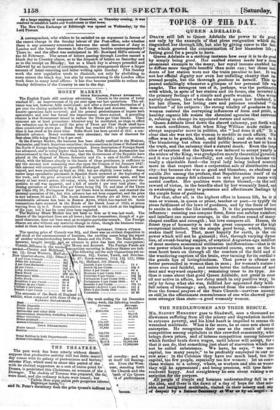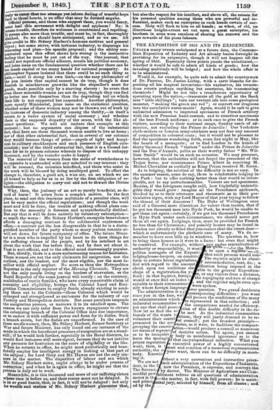THE NEEDLEWOMEN AND THEIR RESCUE.
Mn. SIDNEY HERBERT goes to Shadwell, sees a thousand net diewomen suffering from all the misery and degradation incider to extreme poverty, and his kind heart is impelled to rescue du wretched multitude. What is far more, he at once sets about tl enterprise. He recognizes their case as the result of intent competition among capitalists in this crowded community, whit brings down prices, and of intense competition among labourer which further beats down wages, until labour will accept, for o that it can do, that something just short of starvation which cat not be called subsistence. We have, he says, " too mu( capital, too many people," to be profitably employed in our no row area: in the Colonies they have too much land, too lin capital, too few people, especially too few women : let us cony, these women to a colony, where, as workers and also as wome they will be appreciated ; and being precious, will ipso facto rendered happy. And straightway he sets about raising a su scription for the purpose. All people of simple and humane understanding fall in wi the idea, and there is the dawn of a day of hope for that miso able and benighted multitude, visited in their misery and nig of despair by a former Secretary at War as by an angel : a truly to carry that too strange yet inborn feeling of trustful hope back to those hearts, is an office that may be deemed angelic. Official persons, and those who support them, you would fancy, must hail this movement with delight and applause ? No: it means trouble, therefore its welcome is constrained and repelling. It means also more than trouble, and must be, in fact, thoroughly disliked. So we should have anticipated, and so we see. All give credit to Mr. Sidney Herbert's humane motives and general object ; but some strive, with tortuous industry, to disparage his reasoning and plan—his specific proposal ; and the ability concentrated upon this effort shows how strong is the instinctive feeling that he must be put out of the way. One journal, that would not repudiate official alliance, assails his political economy, sad joins issue on the fundamental question whether there can be too much capital or too many hands for national prosperity. As philosopher Square insisted that there could be no such thing as pain)—until it stung his own limb,—so the easy philosopher of the pen insists that capital cannot be de trop, though it does flourish in mischievous growths like the slopseller's mart for goods, made possible only by a starving slavery : he avers that even these miserable women are not de trop, though they can find no better use for themselves than the degrading toil on which their life is not supported but suspended. Another philosopher, more openly Ministerial, joins issue on the statistical question, whether some of these women may not be thrown out of work by be increase of domestic industry among the thrifty,—in itself a return to a ruder system of social economy ; and whether there is the supposed disparity of the sexes, with the like abstract questions. We will not imitate that example at this moment: but no arguments can dispose of the substantial fact, that here are these thousand women unable to live at home ; nor of that other substantial fact, that in several of our colonies they would become things of price—angels of light and happiness to solitary stockkeepers and such pioneers of English colonization; nor of the third substantial fact, that it is a blessed fortune for us to possess colonies wherein to dispose of this unhappy thousand, and by the transfer make it happy.
The removal of the women from the scene of wretchedness to its opposite is unattended with any mischief to any interest: they will be rescued, the colonists benefited, and those who assist in the work will be blessed by doing unalloyed good. To effect the change is, therefore, a good act, a wise act., an act which we are all bound to help so far as in us lies by the first obligation of religion—the obligation to carry out and not to thwart the Divine beneficence.
Why, then, the jealousy of an act so purely beneficial, so devoid of harm ? It arises from a complex motive. In the first place, to send out this feminine multitude of a peculiar class, will not be easy under the official regulations; and though the work must and will be done, the trouble of making official plans conform to the necessity is foreseen and sympathetically disliked. But say that it will be done entirely by voluntary subscription— so much the worse : Mr. Sidney Herbert's energetic benevolence affords a damaging contrast to the coldhearted supineness of office,—a contrast not the less disagreeable in that he is a distinguished member of the party whom so many jealous tenants-atwill set down for future occupancy of office. The future Minister is a man who is impelled by his heart to de these things for the suffering classes of the people, and by his intellect to set about the work that lies before him ; and he does set about it. That is anti-official, and to the official mind distressingly popular.
But, thirdly, there is a more embarrassing reason for hesitation. These women are not the only claimants for emigration, nor the earliest, nor the loudest, nor the most eligible, nor the most familiar with official neglect. No more so than the Metropolita.n Reporter is the only reporter of the Morning Chronicle. They. are not the only people living on the borders of starvation, as the Rural Reporter of the same journal will testify : on the contrary, multitudes of rustic families, who have every conceivable claim of necessity and eligibility, besiege the Colonial Land and Emigration Commissioners to employ funds already existing in sending them out to the Colonies—those Colonies which would be enlarged and strengthened as customers for the industry of our Factory and Metropolitan districts. But some paralysis suspends the emigration process, or narrows it to its smallest span. The reason we can only infer from the known repugnance to elevate the colonizing branch of the Colonial Office into due importance, or'to endow it with sufficient power and force for its duties. Such a branch exists, but the duties are unperformed. In the case of these needlewomen, then, Mr. Sidney Herbert, former Secretary at War and future Minister, has only found out one instance of the made in which the beneficent processes of emigration are at a standstill; if he would look further, especially in the Rural districts, he would find instances still more signal, because they do not involve any pretexts for hesitation on the score of eligibility or the like. When he returns to office, he might most patriotically and beneficially employ his intelligent energy in looking at that part of the subject ; for Lord Grey and Mr. Hawes are not the only sinners in the matter. The disparities of labour and sex which Mr. Sidney Herbert notes ought alma s to be under process of Correction; and when he is again in office, he might see that the process is duly set to work. Meanwhile it is this thousand and more of our suffering sisters whose case is before us, and their rescue must not be delayed. It is in so good hands, that, in fact, it will not be delayed : not only he wealth and station of Mr. Sidney Herbert guarantee that, but also the respect for his intellect, and above all, the esteem for his personal qualities among those who are powerful and influential, makes such an enterprise in such hands certain of success. Help will flock to him on all hands ; as when, of old, an illustrious knight-errant set out upon a great enterprise, his brothers in arms were emulous of sharing his renown and the pure rewards of his pious labours.

























 Previous page
Previous page